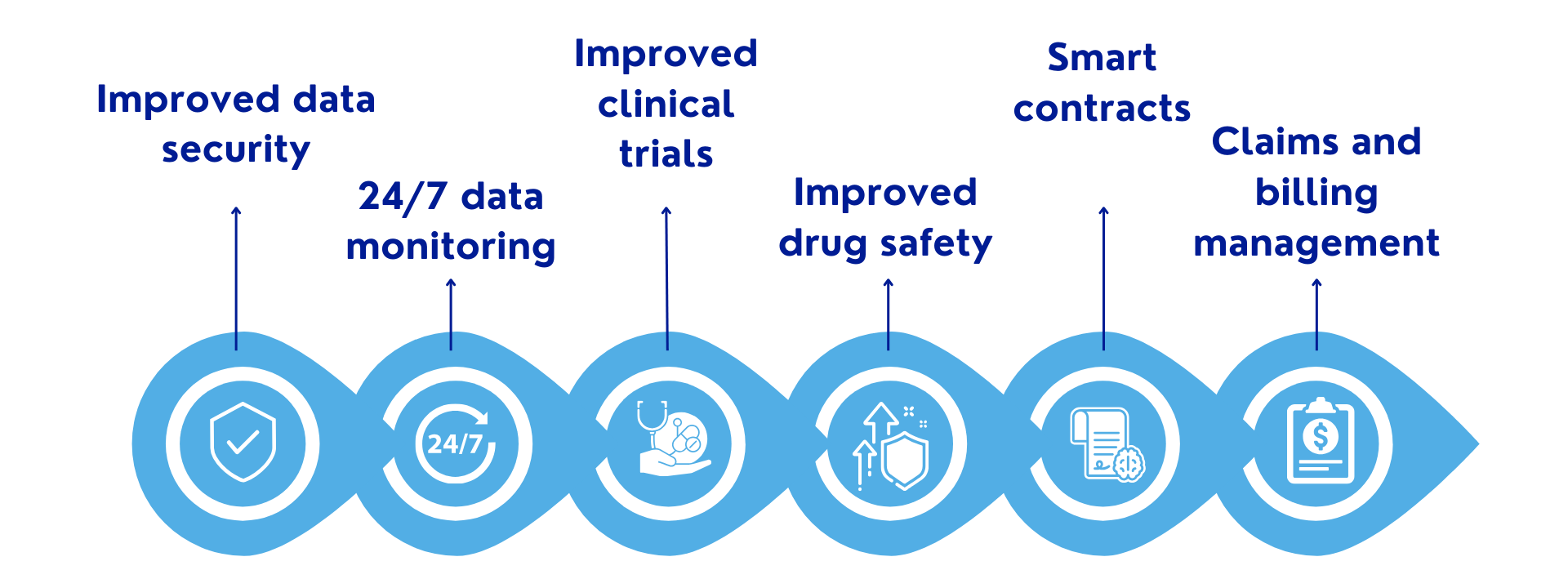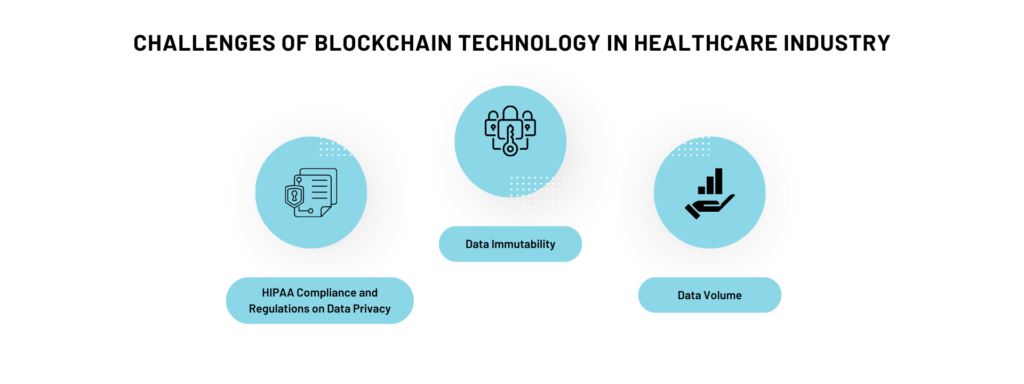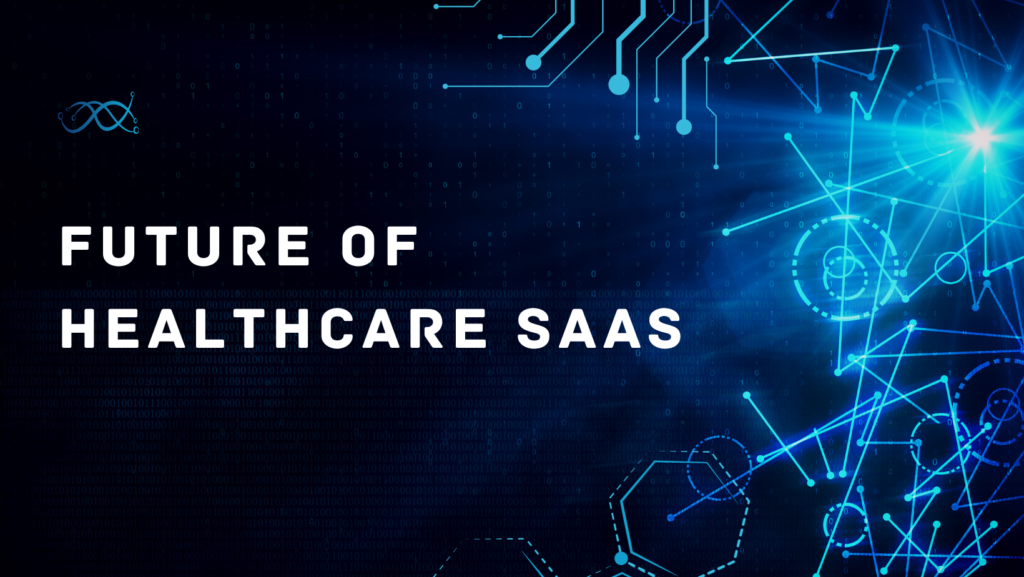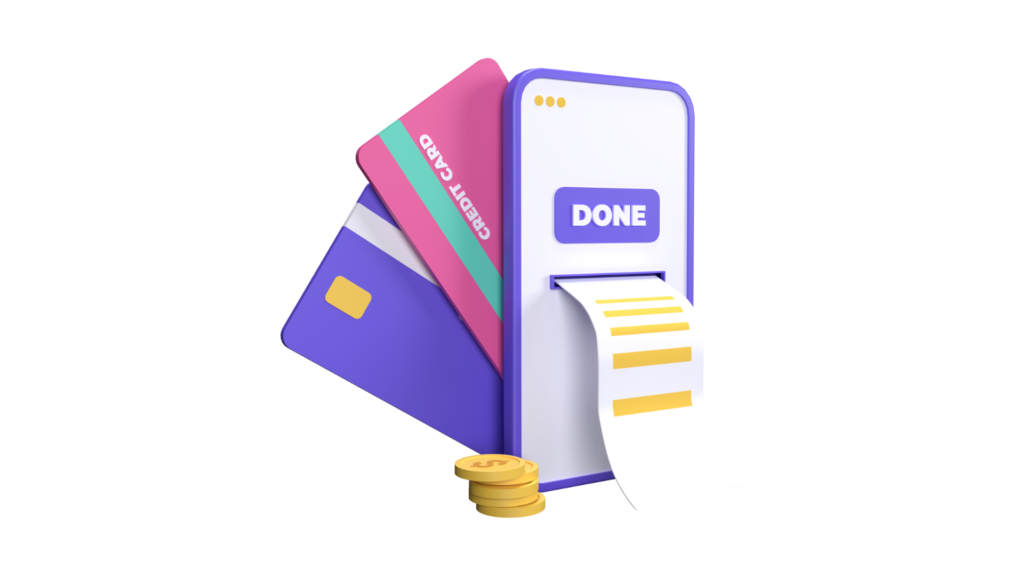Healthcare, an integral aspect of society, continually evolves to address patient and practitioner needs. Recent attention has been drawn to the potential of blockchain technology in revolutionizing healthcare. Is this enthusiasm justified, or is blockchain in healthcare simply hyped without substantial impact?
The participation of major industry giants like IBM, Microsoft, and Google in blockchain research for healthcare underscores the tangible potential of this technology, moving beyond mere speculation.
Estonia’s partnership between the e-health foundation and Guardtime is a prominent instance where all medical records are securely stored on a decentralized platform. This pioneering method facilitates effortless access to patient records for healthcare professionals, significantly elevating the standard of patient care.
As per PR Newswire, the global blockchain in the healthcare market is set to reach a substantial value of $7308.32 million by 2028, demonstrating an impressive compound annual growth rate (CAGR) of 76.30% from 2021 to 2028.
What is blockchain in healthcare?
The intricate nature of the healthcare sector involves numerous stakeholders responsible for patient care, such as doctors, hospitals, insurance firms, and government agencies. Blockchain technology has the potential to enhance communication among these entities, simplifying the exchange of vital information crucial for patient treatment.
As an illustration, blockchain in healthcare establishes a secure and decentralized platform aimed at storing medical records. This empowers patients with complete authority over their health data and enhances accessibility for medical practitioners to retrieve blockchain-based medical records from any location effortlessly.
Previously, there have been numerous instances of sensitive medical information being compromised or unlawfully accessed.
According to GlobeNewswire, in 2021 alone, over 50.4 million patient records were breached. Additionally, the World Health Organization (WHO) approximates that around 30% of medications in certain regions of Latin America, Africa, and Asia are counterfeit.
Nevertheless, these alarming statistics necessitate diverse measures to assist the healthcare sector in addressing these challenges and devising remedies to mitigate them. This is where blockchain technology steps in within the healthcare domain, offering potential solutions by diminishing the risks associated with data fraud, enhancing transparency, and fostering more effective healthcare systems.
Ways blockchain is transforming the healthcare industry
Blockchain technology offers numerous advantages to the healthcare sector, encompassing aspects such as data security, data tracking, and additional benefits. In this segment, we will explore and elaborate on some of the key advantages and potential applications of this technology to enhance the industry.

1. Improved data security
Blockchain, functioning as a decentralized database, facilitates secure, transparent, and immutable management of healthcare data. When applied in the healthcare sector, blockchain technology holds the potential to address prevalent industry challenges, ranging from data breaches to interoperability hurdles and fraudulent activities.
Through the integration of blockchain in healthcare systems, patient data gets stored across a decentralized network instead of a centralized server. This significantly heightens the complexity of hackers attempting to breach or manipulate medical information. Moreover, blockchain enables various healthcare providers to exchange data securely while safeguarding the privacy of patients.
2. 24/7 data monitoring
Continuous monitoring of data remains an essential requirement within the healthcare realm for the efficient management and enhancement of electronic health records. Given the criticality of numerous lives affected daily, even the slightest margin of error can result in catastrophic outcomes.
From monitoring a patient’s blood pressure readings to recording a doctor’s prescriptions, every aspect of a patient’s health data necessitates round-the-clock monitoring and accessibility. Regrettably, the current healthcare infrastructure often falls short of providing this level of data availability due to several factors, including interoperability challenges and data breaches.
This is where blockchain technology plays a pivotal role. By its very nature of being distributed, blockchain has the potential to ensure 24/7 data availability, thereby improving the management of electronic health records. Furthermore, blockchain offers a promising solution to tackle interoperability issues by establishing a standardized platform for seamless data exchange among diverse healthcare providers.
3. Improved clinical trials
A report indicates that in 2021, the global market size for clinical trials reached USD 38.7 billion and is anticipated to ascend to USD 52.0 billion by 2026, demonstrating a projected Compound Annual Growth Rate (CAGR) of 6.1%. The growth of this market is propelled by various factors including the upsurge in clinical trials, amplified demand for outsourcing research and development, and the emphasis on drug commercialization.
Utilizing blockchain in healthcare offers a promising solution to address various challenges by establishing a secure and transparent system for storing and overseeing clinical trial data. Through blockchain, every stage of the clinical trial procedure can be documented, simplifying data monitoring and error detection. Moreover, blockchain has the potential to authenticate the identities of patients and healthcare professionals, guaranteeing that only authorized individuals can access clinical trial information.
4. Improved drug safety
Adverse drug reactions pose a significant issue within the healthcare sector, leading to numerous hospitalizations and fatalities annually. Additionally, the expenses associated with treating these reactions are estimated to be billions of dollars each year.
Utilizing a blockchain-powered database offers the capability to monitor drug origins along the supply chain, enabling the swift detection of counterfeit or altered medications. Furthermore, blockchain technology facilitates the tracking of patient outcomes, providing early identification of adverse reactions.
Improving drug safety stands as just one example of how blockchain has the potential to revolutionize the healthcare industry.
5. Smart contracts
Smart contracts within blockchain hold the potential to optimize various procedures in the healthcare sector. They can automate insurance claim processing, validate eligibility for benefits, and facilitate appointment scheduling.
Additionally, smart contracts could manage patient data and records, guaranteeing that confidential information is accessed only by authorized individuals.
6. Claims and billing management
Claims and billing management involves handling the filing and processing of medical claims linked to a patient’s diagnosis, medications, and treatments. Instances of compromised medical files have resulted in fraud and theft cases.
Blockchain offers a solution to curtail these occurrences by employing a system that records and stores medical data in a transparent digital ledger. Any alterations made to the information become visible to all participants in the blockchain network.
Beyond the previously mentioned benefits of blockchain in healthcare, there exist numerous other advantages, including the reduction of medical errors, improvements in public health, and various additional benefits.
Blockchain Healthcare Use Cases
As blockchain adoption in healthcare unfolds, certain applications are being implemented by startups specializing in blockchain in healthcare, while others are undergoing testing and trials by major organizations to safeguard their operations. Let’s explore real-life instances where blockchain is applied in the healthcare sector.
Drug traceability
Drug traceability entails monitoring a drug’s journey from manufacturers to patients within the supply chain. Blockchain technology holds the potential to revolutionize this process by establishing an unchangeable record of drug product movements. Presently, the majority of drug traceability systems depend on a centralized database susceptible to tampering or hacking.
Employing a blockchain-driven system would furnish a decentralized, immutable ledger of all drug product movements, ensuring enhanced security. This capability would enable swift detection and recall of counterfeit products by regulatory bodies. Furthermore, by integrating blockchain with artificial intelligence and the Internet of Things, real-time tracking of drug products could be achieved, facilitating a more prompt and productive response to drug shortages or recall situations.
Electronic Health Records
Electronic health records (EHRs) present a significant application of blockchain in healthcare, promising advancements in patient care, cost reduction, and life-saving potential. Yet, challenges, notably in data security, accompany EHR adoption.
Currently, EHRs reside in centralized databases susceptible to cyber threats and data breaches, jeopardizing patient data integrity. Blockchain offers a potential remedy by providing a decentralized, secure method for storing EHRs. Through blockchain, patients gain secure access to their medical information, ensuring that only authorized individuals can retrieve it.
Blockchain in healthcare startups are actively developing blockchain-based EHR solutions. For instance, Medicalchain, a UK-based startup, has developed a platform tailored for secure health record storage and sharing. Additionally, Patientory is focused on delivering a blockchain-driven EHR solution, empowering users to manage their health information securely.
Blood plasma supply chain
Blockchain Technology holds the promise of optimizing the plasma supply chain in healthcare, ensuring accurate and readily available information for all involved parties. Plasma derivatives play a crucial role in life-saving therapies, yet the existing supply chain, involving numerous hospitals and blood banks worldwide, is intricate and often plagued by inaccuracies and inefficiencies.
These issues frequently result in critical shortages of plasma precisely when patients require it urgently, potentially leading to higher mortality rates. Projections suggest that the plasma supply chain market will expand significantly, reaching a value of $15.5 billion by 2024.
Blockchain Technology offers a potential solution by establishing a decentralized platform that enables stakeholders to share and track plasma shipments in real time. Through this approach, blockchain has the potential to ensure continuous access to life-saving treatments for patients.
Canadian Blood Services (CBS) partnered with EY Canada to implement blockchain technology, facilitating real-time traceability and visibility of blood products across the system, emphasizing the potential of blockchain in improving the healthcare supply chain.
Prescription Drug Monitoring
Blockchain technology has the potential to revolutionize healthcare by improving the monitoring of prescription drug usage. About 18 million individuals, accounting for over 6% of the US population aged 12 and above, use prescription drugs annually. Using blockchain ensures a secure and unalterable method to track the distribution of prescription medications.
Each time a prescription drug is dispensed, a unique record is generated and securely stored on the blockchain. This system allows authorities to closely monitor the movement of prescription drugs and detect any potential patterns of misuse. Moreover, blockchain’s authentication capabilities ensure that only authorized patients and healthcare professionals can access these medications.
One pioneering startup, BlockMedx, is actively developing a specialized blockchain platform designed for managing electronic prescriptions. Their platform empowers patients to securely handle their prescriptions while enabling pharmacists to authenticate prescriptions and monitor the movement of prescription drugs effectively.
Medical Staff Credential Verification
In the realm of healthcare, another crucial application of blockchain technology revolves around verifying the credentials of medical staff. The United States boasts over 1,073,616 licensed physicians, making it a challenge to efficiently authenticate each professional’s qualifications.
Consequently, an increasing number of institutions are adopting blockchain to validate the credentials of medical staff. This utilization of blockchain in credential verification enables swift and secure confirmation of medical professionals’ qualifications and expertise.
Furthermore, blockchain offers a permanent and transparent record of credentialing details, facilitating the monitoring of medical staff’s career trajectories. Consequently, the adoption of blockchain-based credential verification is becoming integral in upholding the quality of care within healthcare establishments.
Supply Chain Management
Supply Chain Management in the healthcare sector relies heavily on the global network of medical products and services. Blockchain applications in the healthcare industry play a crucial role in addressing various challenges associated with supply chain management. Technologies such as RFID and EPCIS (electronic product code information service) are employed to enhance the security of the drug supply chain.
This technology is employed to verify that the active ingredients utilized in drug manufacturing adhere to medical standards. Additionally, blockchain enables the tracking of the origins of counterfeit drugs and devices. Several companies are actively developing blockchain-based solutions for the healthcare industry to address these concerns.
Chronicled, a company based in the United States, has created a platform that utilizes blockchain and the Internet of Things (IoT) to monitor the flow of medical supplies. The Chronicled platform enables manufacturers, distributors, and pharmacies to monitor the real-time movement of medical supplies, ensuring that only authorized individuals have access to them.
Security Measures for IoT in Remote Patient Monitoring
The Healthcare sector is progressively turning to the Internet of Things (IoT) for remote patient monitoring. Wearable sensors and other IoT devices play a crucial role in gathering diverse data, encompassing metrics like heart rate, body temperature, and blood pressure. Subsequently, this data is transmitted to a central location, enabling healthcare professionals to oversee and analyze it.
Nevertheless, the security of IoT devices is frequently compromised, exposing them to the risks of hacking and data breaches. This poses a significant threat in the healthcare sector, where unauthorized access to sensitive patient data is a serious concern. The integration of blockchain in healthcare offers a solution to this problem by establishing a secure method for storing and sharing data.
Furthermore, blockchain has the potential to establish secure IoT networks. An illustration of this is the IOTA platform, specifically crafted to furnish a secure ecosystem for IoT devices. Utilizing blockchain technology, the IOTA platform constructs an immutable data ledger, resistant to tampering. This ledger serves the dual purpose of storing information from IoT devices and monitoring the mobility of these devices.
Challenges of blockchain technology in healthcare industry

Despite the potential advantages of incorporating blockchain in healthcare, various challenges are associated with the implementation of this technology. Some of these challenges are outlined below:
HIPAA Compliance and Regulations on Data Privacy
The Health Insurance Portability and Accountability Act (HIPAA) is a comprehensive U.S. healthcare law that enforces stringent rules regarding the utilization and sharing of patient data.
While blockchain technology holds promise for aiding healthcare organizations in adhering to HIPAA and other data privacy regulations, the specific methods by which blockchain can align with these regulations remain uncertain.
Data Immutability
The inherent characteristic of blockchain, disallowing alterations once information is uploaded, presents both advantages and challenges. While immutability enhances security, it simultaneously poses constraints on scalability.
Addressing this immutability challenge would necessitate an extension of the current architecture, allowing for the recording of edits or implementing a strategy involving clever on-chain and off-chain data partitioning in the short term.
Data Volume
Undoubtedly, the healthcare industry generates a substantial amount of medical data. This volume can easily exceed the storage capacity of a typical blockchain architecture due to constraints posed by the block size limit.
Hence, a thoughtfully designed architecture becomes an evident and intelligent solution by constructing system components that store on and off-chain data after a meticulous examination of data types relevant to specific domains. For instance, integrating on-chain and off-chain data in either traditional RDBMS/No-SQL or in an IPFS can address the data limit challenge
The advantages of incorporating blockchain in healthcare present distinctive prospects for simplifying processes, fostering trustless collaboration, and ensuring the security and immutability of information.
So, in summary – while blockchain has not initiated a healthcare revolution just yet, it is undoubtedly on the path to bring about transformative changes. If you believe your organization is prepared to embrace this shift and adopt emerging ideas, you may explore Digiatto IT Services, a reputable app development company specializing in blockchain development services, to elevate your business.



Pingback: Digital Transformation in Healthcare Industry - Health SaaS Pro
Pingback: Role of Cloud Computing in Healthcare Industry - Health SaaS Pro
Pingback: Top Healthcare App Trends in 2024 - Health SaaS Pro
Pingback: Improving Electronic Health Records in 2024 - Health SaaS Pro
Pingback: Improving Electronic Health Records in 2024 - Health SaaS Pro
Pingback: Software as a Medical Device - HealthSaaSPro